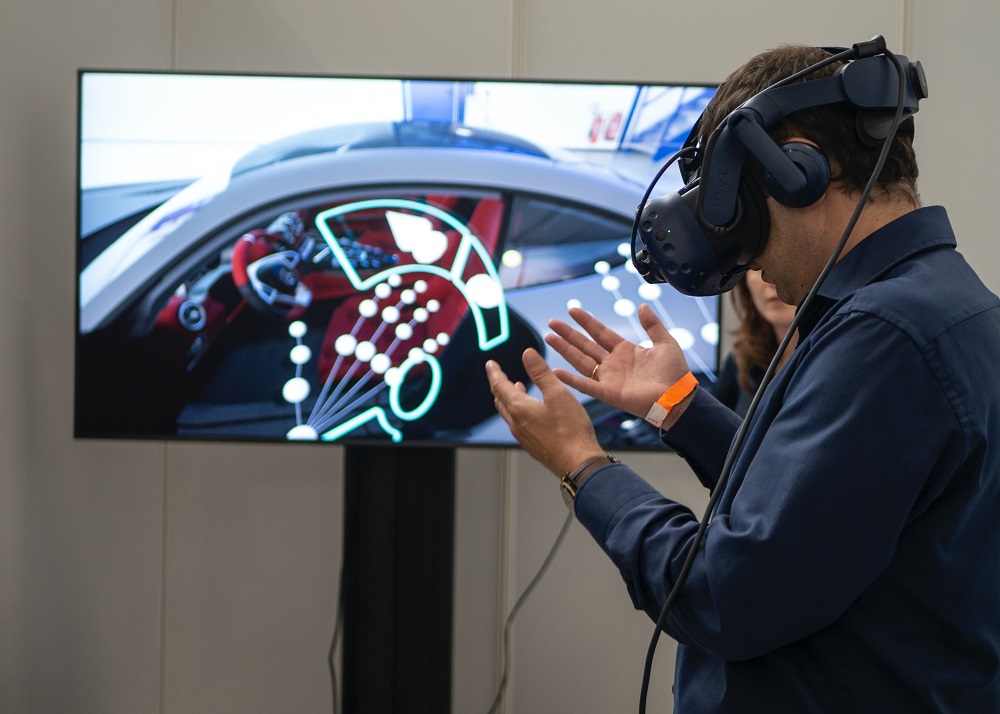Have you seen the movie Ready Player One? If so, you’ve already seen a glimpse into the future: the metaverse.
The metaverse is a unified, real-time virtual world. It’s basically a digital version of your life (like a less-wonky version of The Sims). According to the experts, it’s the next stage of the internet.
We think of the metaverse as this cool, futuristic possibility, but some components of the metaverse are already here. Sure, you might not be able to hop on the metaverse and hang out with your friends right now, but the metaverse will be the next phase of how consumers interact with technology. And any time consumers change their relationship with technology, it has a palpable effect on marketing.
Curious about what lies ahead? Let’s dig into how we predict the metaverse will work and how it will affect marketing.
What is the metaverse?
The word “metaverse” has been around since 1992, but it’s been a far-off pipedream for decades. The good news is that most of the technology for the metaverse is available now, albeit in disconnected forms.
The metaverse is still forming, but experts agree that it’s:
- A digital space built by private companies.
- A real-time digital space that runs parallel with the “real” world, just like the internet.
- A space where people will be able to play games, hang out with friends, and even do their work.
- A space that uses augmented reality (AR) and virtual reality (VR) to bring traditionally flat, static content to life.
If your kids are obsessed with Fortnite, World of Warcraft, or Roblox, you’ve seen snippets of the metaverse in action already. Games were the first to really capitalize on the metaverse (lookin’ at you, Fortnite concerts), but it’s a big opportunity for brands, too.
The metaverse is all about virtualizing your life. While it only exists in bits and pieces right now, experts predict that it will include neat features like:
- Avatars: This is going to be “you” in the metaverse! Just like in a video game, you’ll be free to create a digital version of yourself. Some folks will recreate themselves as they are in the real world, while others will fabricate an entirely different identity. The difference here, though, is that your metaverse identity will be consistent across the different platforms and services you use.
- A digital economy: Cryptocurrency is dominating the headlines, and for good reason. This digital currency has the potential to shape the future of the metaverse. Non-fungible tokens (NFTs) will likely become the basis for buying digital goods in the metaverse, too. With an NFT, you get exclusive ownership of a digital good thanks to licensing. It’s not too dissimilar from buying a Porsche in real life that only you have the keys to. While people are using NFTs for memes and artwork right now, in the future of the metaverse, we’ll buy digital clothing, cars, and other valuables in this format, too.
- Virtual homes: That’s right. People are already prospecting for digital real estate in the metaverse. Similar to your email inbox, your virtual home will be your main base of operations in the metaverse. Experts say this will be a place to check your notifications, access different metaverse apps, and even hang out with friends and family from across the globe. Heck, this might even lead to a boom in digital real estate, where people pay top dollar for more storage space or digital square footage. Time will tell!
- Workspaces: We don’t just use the internet for entertainment; it’s also for doing your job, and the metaverse isn’t any different. Microsoft is pioneering this approach by using VR headsets for some of its meetings. In a world where more people are working, training, and managing remote teams, metaverse workspaces will add a dash of connection to our remote interactions again.

How will marketing work in the metaverse?
Yes, a lot of what we already know about the metaverse is speculative. But experts say it’ll be here in as little as five years, which means brands need to prepare now to take advantage of it. Follow these 6 tips to prepare for marketing in the metaverse.
Metaverse tip #1: Capitalize on NFTs
NFTs are pretty speculative right now, but according to the experts, they’ll become the basis of the metaverse economy.
You might not be able to pick up and hold an NFT, but it isn’t too unlike the branded swag you pass out at conferences. That’s why it’s so important for brands to create their own NFTs. These digital tokens build brand buzz in the metaverse, especially if you send your customers exclusive, limited-edition goods.
If you haven’t already, try creating NFTs for your business right now. I’ve had clients run contests where they offer NFTs as prizes, as well as exclusive discounts and freebies that come with the NFTs.
Metaverse tip #2: Sell digital services
NFTs will be the products and goods of the metaverse, but people will still need services. For example, I’m a content creator. The medium might change, but people will always need help creating their content.
The information marketplace is going to be booming in the metaverse. If you can’t figure out a way to capitalize on NFTs, try to offer a digitized service that’s metaverse-friendly. That might include:
- Multi-factor security services for the metaverse
- Fact-checking
- Account consolidation
You get the idea. If users in the metaverse have a need, be prepared to shift your services to accommodate their biggest pain points.

Metaverse tip #3: Prepare for multimedia SEO
SEO is all text-based right now because search engine bots can’t “read” multimedia like video. But I predict that this will change within the next 10 years. Bots are already relying on transcripts to review and rank videos, and this will likely be the case in the metaverse.
In the metaverse, search engines will be able to rank rich, multimedia content more effectively than they do now. That means brands need to learn how to optimize things like YouTube videos, podcasts, and images right now so they aren’t left behind in the metaverse.
Metaverse tip #4: Plan events in the metaverse
COVID-19 made it darn near impossible to safely host events. But with the metaverse, you can easily host international events with fewer worries. We’ve already seen how successful digital events can be thanks to Fortnite, so brands need to plan events within the metaverse.
And yes, this is different than hosting a webinar on Zoom. In the metaverse, you’ll need to promote your brand with immersive events and experiences. That might mean creating a 3D concert for VR or hosting a digital conference where everyone attends as their avatar.
Metaverse tip #5: Partner with influencers
Honestly, I don’t think influencers are going to go away any time soon. They’re already masters at crafting content and engaging with audiences. I can’t even imagine the cool things influencers will do with a richer medium like the metaverse!
So, if you haven’t already worked with influencers, now’s the time to try. If you perfect your process now and manage to find a handful of innovative, trustworthy influencers, you’ll be better poised for metaverse domination.
Metaverse tip #6: Create interactive ads
Right now, the internet is pretty passive. Brands pay out the wazoo for ads that users scroll past or skip. Fortunately, the metaverse gives advertisers a richer way to interact with shoppers. I’m not saying you’ll be able to capture every single user’s attention, but you’ll have a lot more creative freedom.
Instead of cranking out generic, passive ads, in the metaverse, you’ll be able to do more interactive ads. Treat this almost as a booth at a trade show where you can interact with people. Ad platforms haven’t caught onto this trend yet, but you’ll likely be able to:
- Give 3D product demos. You can actually do a version of this on your website right now if you add 3D models to your product pages. This is a lifesaver if you’re in eCommerce and need to cut down on returns or complaints.
- Advertise to people in their digital homes. Similar to ads on the TV, you’ll be able to drop into users’ home base with VR or AR content that gets their attention.
- Promote your brand with 3D games.

The challenges of creating a metaverse
Look, the metaverse sounds really cool and futuristic, but it isn’t without its challenges. Facebook may have changed its name to “Meta,” but we’re at least 5 years away from implementing the metaverse in real life.
We need to solve these challenges to make the metaverse appealing to both users and brands:
- Hardware: Not a lot of people have VR equipment right now. And the ones who do say it’s clunky and unpleasant to use for long periods of time. Users aren’t going to hop on the metaverse train until this tech is cheaper and better.
- Connectivity: Wifi connectivity is already a challenge. If we’re moving into the metaverse—which is going to gobble up data like nobody’s business—it adds another boundary to adoption. Connectivity is an equity issue, but it also limits a business’s audience in the metaverse.
- Security: This is an increasing concern, and for good reason. The number of cyberattacks skyrocketed during the pandemic, and it isn’t showing any signs of slowing down. As we digitize more of our lives, we open ourselves up to attacks. It’s extra important for users and brands to lock their digital properties down.
- ROI and attribution: I’m not going to sugar-coat it: attribution is going to be hard to nail. We’ve already seen how difficult it is to measure attribution in a multichannel environment, and the metaverse is going to make this even more difficult. If your biz hasn’t already, dip your toes into attribution modeling to perfect your process now, before even more channels enter the fray.
The bottom line
Right now you can access early versions of the metaverse on platforms like Horizon. While the metaverse is unformed and speculative today, it’s still coming. The building blocks of the metaverse are available to us right now, so brands need to prepare for an increasingly digitized future. Follow these 6 tips to start planning for the future right now—whether we like it or not, the metaverse is coming, and we need to prepare.

